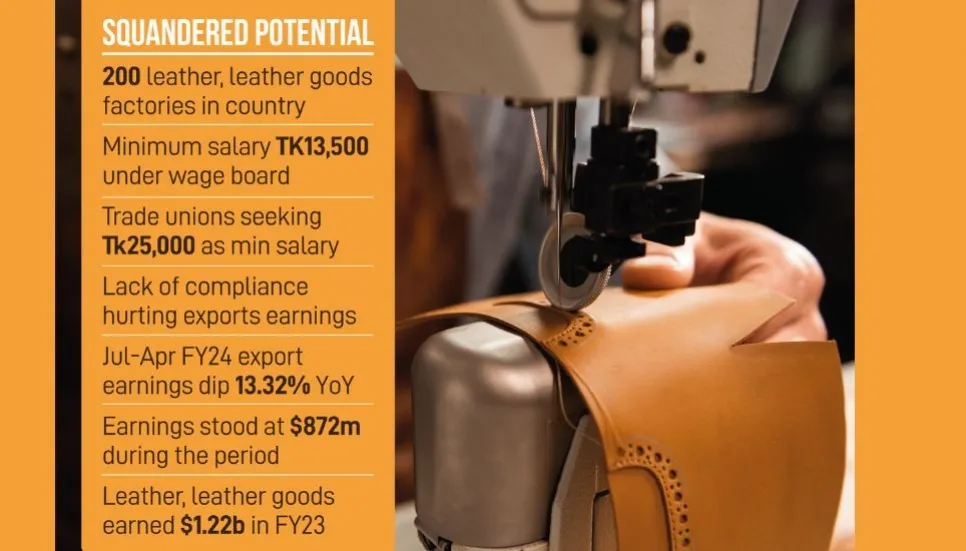
The Centre for Policy Dialogue (CPD) has proposed a Tk 22,776 minimum wage for tannery workers, taking into consideration 12 indicators such as costs, the standard of living, productivity, inflation, risk, socio-economic conditions, and other relevant factors.
The think tank also recommended implementing a unified grading system as tannery workers cannot get promotions, promoting mobile financial services for paying wages, minimising contractual recruitment of workers through third parties, and increasing female participation.
These proposals came at a media briefing titled “Determination of New Minimum Wage of Tannery Industry: Challenges of Implementation” organised by CPD, in partnership with the Leather Development Forum (LDF) and the OSHE Foundation, in Dhaka on Saturday.
The think tank recently conducted a study titled “Minimum Wage for the Bangladesh's Tannery Industry in 2024: An Empirical Analysis,” aiming to propose a minimum wage, and review the performance of key indicators relevant for the setting up of minimum wage as stipulated in the Bangladesh Labour Act.
CPD Research Director Khondaker Golam Moazzem moderated the briefing, while CPD Senior Research Associate Tamim Ahmed presented the keynote.
Delivering welcome remarks, Moazzem said, “Leather sector, the country’s second-largest export industry, largely depends on the tannery industry’s performance, as the sector’s exports reached $1,223.62 million in FY23, as per the Export Promotion Bureau (EPB).
“Minimum wage for tannery workers, set at Tk 13,500 in 2018, needs urgent review due to inflation and economic pressures. With recent increases in RMG workers' wages, it is imperative to raise tannery workers' minimum wage accordingly.”
He added, “It is crucial because tannery workers have to work in the presence of hazardous substances and chemicals. Besides, it is also vital for ensuring compliance with RBC and HRDD, which are becoming more widely adopted on a global scale.
“An increase in wages will have a positive impact on the leather industry.”
As there is no scope for promotion within the current system, CPD proposed to introduce subgrades within some grades (A, B, and C within Grade 5), which would create opportunities for promotion and enhance worker motivation.
At least 16 per cent of surveyed tannery workers earn below Tk 13,500 monthly, despite working over a year, while 43 per cent earn less than Tk 15,881 after six years, indicating a need for wage adjustments, CPD said.
Present as special guest at the briefing, Minimum Wage Board Chairman Liaquat Ali Mollah said, “The minimum salary of tannery workers will be determined based on the opinions of the owners and workers in the next board meeting.
“Wages are not implemented due to weak leadership. You can pay wages digitally similar to the RMG industry. I will call upon the owners to pay the workers’ wages on time. Goodwill on the part of the owners is required in rescheduling the pay structure.”
The study revealed that the average ratio of male and female workers is around 20:1, where 96 per cent workers are predominantly male.
“The number of female workers in this industry is low. It can be expected to increase if the working environment is good. We try to be on behalf of the workers. We will try to provide a stock structure that benefits both the owner and the worker,” Liaquat added.
According to the tanners' association, the industry comprises approximately 200 active tanneries spread across 127 plots in the Savar area, contributing a substantial $1.2 billion in leather product exports last year.
Md Abdul Malek, general secretary of Tannery Workers Union (TWU), said, “The government formed a new wage board in August last year to propose a new minimum wage. There have been three wage boards, but they have not been implemented.
“The minimum wages of Bangladesh’s neighbouring countries are relatively high, except Pakistan and West Bengal of India. Our union conducted a survey and fixed the minimum wage of leather workers at Tk 25,000.”
Terming CPD's minimum wage proposal unrealistic, Bangladesh Tanners Association (BTA) President Md Shaheen Ahmed said, “Our business is getting worse day by day. Our export in FY2018 was $180 million which was $120 million last fiscal year.
“Previously, our unit of leather price was $1.5 which has now almost declined to just $0.75. China sets the price they want. They buy from us at lower prices and sell at higher prices in the EU because they comply with RBC and HRDD. But we cannot comply due to an increase in production cost.”
He added, “The price of gas has increased by 200 per cent, the price of electricity has increased four times, it will increase in the future, and the 10 per cent cash incentive on crust leather has also been reduced. As a result our overall production has decreased.
“We hope that the wage board will determine a realistic and acceptable wage so that we traders are not disadvantaged.”
OSHE Foundation Vice Chairman SM Morshed, BTA Vice Chairman Md Mizanur Rahman, TWU President Md Abul Kalam Azad were present at the briefing among others.